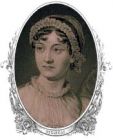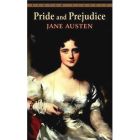傲慢与偏见 Pride and Prejudice
《傲慢与偏见》是简·奥斯汀(Jane Austen)最早完成的作品,她在1796年开始动笔,取名为《最初的印象》,1797年8月完成。她父亲看后很感动,特意拿给汤玛·卡士德尔,请他出版,但对方一口回绝,使得他们十分失望。后来,她重写了《最初的印象》并改名为“傲慢与偏见”于1813年1月出版。《傲慢与偏见》是简·奥斯汀的代表作。这部作品以日常生活为素材,一反当时社会上流行的感伤小说的内容和矫揉造作的写作方法,生动地反映了18世纪末到19世纪初处于保守和闭塞状态下的英国乡镇生活和世态人情。这部社会风情画式的小说不仅在当时吸引着广大的读者,时至今日,仍给读者以独特的艺术享受。
简·奥斯汀(1775年12月16日~1817年7月18日)英国女小说家。生于乡村小镇斯蒂文顿,父亲是当地教区牧师。奥斯丁没有上过正规学校,但受到较好的家庭教育,主要教材就是父亲的文学藏书。奥斯汀一家爱读流行小说,多半是庸俗的消遣品。她少女时期的习作就是对这类流行小说的滑稽模仿,这样就形成了她作品中嘲讽的基调。她20岁左右开始写作,共发表了6部长篇小说。1811年出版的《理智与情感》是她的处女作,随后又接连发表了《傲慢与偏见》(1813)、《曼斯菲尔德花园》(1814)和《爱玛》(也译《艾玛》)(1815)。《诺桑觉寺》(又名《诺桑觉修道院》)和《劝导》(1818)是在她去世后第二年发表的,并署上了作者真名。
简·奥斯汀是世界上为数极少的著名女性作家之一,介于新古典主义和浪漫运动的抒情主义之间的“小幅画家”和“家庭小说”家,文学评论家眼里堪与莎士比亚在不朽性方面相提并论的英国作家。2000年,BBC做过一个“千年作家评选”活动,结果奥斯丁紧随莎士比亚之后,排名第二,而且,她是前十位里唯一的女性作家。这位女性堪称英国之骄傲。她创造出了一大批的人物,开启了19世纪30年代的现实主义小说高潮.英国文学史上出现过几次趣味革命,文学口味的翻新几乎影响了所有作家的声誉,唯独莎士比亚和奥斯汀经久不衰。而这位伟大的女性一生只走过了42个春夏秋冬。
小乡绅班纳特有五个待在闺中的千金,班纳特太太整天操心着为女儿物色称心如意的丈夫。新来的邻居彬格莱(Bingley)是个有钱的单身汉,他立即成了班纳特太太追猎的目标。在一次舞会上,彬格莱对班纳特家的大女儿简(Jane)一见钟情,班纳特太太为此欣喜若狂。参加舞会的还有彬格莱的好友达西(Darcy)。他仪表堂堂,非常富有,许多姑娘纷纷向他投去羡慕的目光;但他非常骄傲,认为她们都不配做他的舞伴,其中包括简的妹妹伊丽莎白(Elizabeth)。伊丽莎白自尊心很强,决定不去理睬这个傲慢的家伙。可是不久,达西对她活泼可爱的举止产生了好感,在另一次舞会上主动请她同舞,却遭到伊丽莎白的拒绝,达西狼狈不堪。彬格莱的妹妹卡罗琳(Caroline)一心追求达西,她发现达西有意于伊丽莎白,妒火中烧,决意从中阻挠。而遭到伊丽莎白冷遇的达西也鄙视班纳特太太及其小女儿丽迪亚(Lydia)及妹妹们的粗俗、玛丽的平庸。在妹妹和好友达西的劝说下,彬格莱不辞而别,去了伦敦,但简对他还是一片深情。
班纳特没有儿子,他的家产将由远亲柯林斯(Collins)继承。柯林斯粗鄙无知,却善于趋炎附势,居然当上牧师。他向伊丽莎白求婚,遭拒绝后,马上与她的密友夏洛特(Charlotte)结婚。附近小镇的民团联队里有个英俊潇洒的青年军官魏克翰(Wickham),人人都夸他,伊丽莎白也对他产生了好感。一天,他对伊丽莎白说,他父亲是达西家的总管,达西的父亲曾给他一大笔遗赠,却被达西吞没了。伊丽莎白听后,对达西更加反感。柯林斯夫妇请伊丽莎白去他们家作客,伊丽莎白在那里遇到达西的姨妈凯瑟琳(Catherine).伯德夫人,并且被邀去她的路馨山庄做客。不久,又见到了来那里过复活节的达西。达西无法抑制自己对伊丽莎白的爱慕之情,向她求婚,但态度还是那么傲慢,加之伊丽莎白对他有严重偏见,便坚决地谢绝了他的求婚。这一打击使达西第一次认识到骄傲自负所带来的恶果,他痛苦地离开了她,临走前留下一封长信作了几点解释:他承认彬格莱不辞而别是他促使的,原因是他不满班纳特太太的轻浮和鄙俗,并且认为简并没有钟情于彬格莱;魏克翰说的却全是谎言,事实是魏克翰自己把那笔遗产挥霍殆尽,还企图勾引达西的妹妹乔治娅娜私奔。伊丽莎白读信后十分后悔,既对错怪达西感到内疚,又为母亲的行为羞愧。她逐渐改变了对达西的看法。
第二年夏天,伊丽莎白随舅父母来到达西的庄园,与他再次相遇。她发现达西变了,不仅对人彬彬有礼,在当地很受人们尊敬,而且对他妹妹乔治娅娜非常爱护。她对他的偏见消除了。正当其时,伊丽莎白接到家信,说小妹丽迪娅随身负累累赌债的魏克翰私奔了。这种家丑使伊丽莎白非常难堪,以为达西会更瞧不起自己。但事实出乎她的意料,达西得知上述消息以后,不仅替魏克翰还清赌债,还给了他一笔巨款,让他与丽迪娅完婚。自此以后,伊丽莎白往日对达西的种种偏见统统化为真诚之爱。彬格莱和简经过一番周折,言归于好,一对情人沉浸在欢乐之中。而一心想让自己的女儿安妮(Annie)嫁给达西的凯瑟琳.伯德夫人匆匆赶来,蛮横地要伊丽莎白保证不与达西结婚。伊丽莎白对这一无理要求断然拒绝。此事传到达西耳中。他知道伊丽莎白已经改变了对自己的看法,诚恳地再次向她求婚。到此,一对曾因傲慢和偏见而延搁婚事的有情人终成眷属。
a.It is a truth universally acknowledged, that a single man in possession of a good fortune, must be in want of a wife.
This is the first sentence of Pride and Prejudice and stands as one of the most famous first lines in literature. Even as it briskly introduces the arrival of Mr. Bingley at Netherfield, the event that sets the novel in motion, this sentence also offers a miniature sketch of the entire plot, which concerns itself with the pursuit of “single men in possession of a good fortune” by various female characters. The preoccupation with socially advantageous marriage in nineteenth-century English society manifests itself here, for in claiming that a single man “must be in want of a wife,” the narrator reveals that the reverse is also true: a single woman, whose socially prescribed options are quite limited, is in (perhaps desperate) want of a husband.
b.“In vain have I struggled. It will not do. My feelings will not be repressed. You must allow me to tell you how ardently I admire and love you.” Elizabeth's astonishment was beyond expression. She stared, coloured, doubted, and was silent. This he considered sufficient encouragement, and the avowal of all that he felt and had long felt for her, immediately followed. He spoke well, but there were feelings besides those of the heart to be detailed, and he was not more eloquent on the subject of tenderness than of pride. His sense of her inferiority—of its being a degradation—of the family obstacles which judgment had always opposed to inclination, were dwelt on with a warmth which seemed due to the consequence he was wounding, but was very unlikely to recommend his suit.
Darcy's proposal of marriage to Elizabeth in Chapter 34 demonstrates how his feelings toward her transformed since his earlier dismissal of her as “not handsome enough.” While Elizabeth rejects his proposal, this event marks the turning point in the novel. Before Darcy asks Elizabeth to marry him, she feels only contempt for him; afterward, she begins to see him in a new light, as certain incidents help illustrate the essential goodness of his character. At this moment, however, Elizabeth's eventual change of heart remains unforeseen—all she thinks of is Darcy's arrogance, his attempts to interfere in Bingley's courtship of Jane, and his alleged mistreatment of Wickham. Her judgment of Darcy stems from her initial prejudice against his snobbishness, just as his pride about his high social status hampers his attempt to express his affection. As the above quote makes clear, he spends more time emphasizing her lower rank and unsuitability for marriage to him than he does complimenting her or pledging his love. “He was not more eloquent on the subject of tenderness than of pride,” the narrator states; Darcy must -prioritize love over his sense of superiority before he is worthy of Elizabeth's hand.
c. Elizabeth was much too embarrassed to say a word. After a short pause, her companion added, “You are too generous to trifle with me. If your feelings are still what they were last April, tell me so at once. My affections and wishes are unchanged, but one word from you will silence me on this subject forever.” Elizabeth feeling all the more than common awkwardness and anxiety of his situation, now forced herself to speak; and immediately, though not very fluently, gave him to understand, that her sentiments had undergone so material a change, since the period to which he alluded, as to make her receive with gratitude and pleasure, his present assurances.
The clunky language with which the narrator summarizes Elizabeth's acceptance serves a specific purpose, as it captures the one moment of joyful incoherence for this supremely well-spoken character. She accepts Darcy's proposal “immediately,” the narrator relates, but “not very fluently.” As Elizabeth allows herself to admit that her love has supplanted her long-standing prejudice, her control of language breaks down. The reader is left to imagine, with some delight, the ever-clever Elizabeth fumbling for words to express her irrepressible happiness.
附件列表
词条内容仅供参考,如果您需要解决具体问题
(尤其在法律、医学等领域),建议您咨询相关领域专业人士。
如果您认为本词条还有待完善,请 编辑



